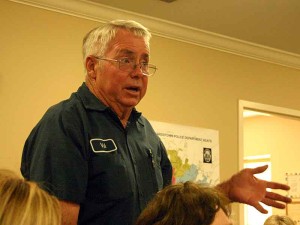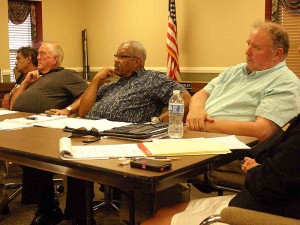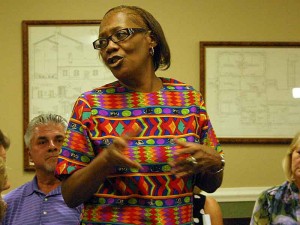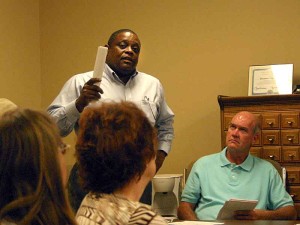Tempers flare as road diet debate stirs passions at BAND meeting
By JIM BROOKS
Nelson County Gazette / WBRT Radio
Tuesday, July 14, 2014 — Tempers flared Tuesday night in discussions about the North Third Street “road diet” at a meeting of the Bardstown Active Neighborhoods Delegation.
Those who did not like the road diet outnumbered those who favored it, but each side spoke frankly about their opinions of the road diet’s impact on Bardstown traffic, businesses and livability.
A “road diet” is a move to reduce traffic speed and make roadways more bike and pedestrian friendly by reducing four lanes — two lanes each going north and south — to one lane in each direction and a shared turning lane in the middle. The North Third St. road diet also includes bicycle lanes on both sides of the street from about Halstead Avenue to Broadway.
Mayor Bill Sheckles began the road diet discussion by explaining the history of how he and the Bardstown City Council were approached by state highway department engineers. Safety is the driving factor behind the road diet changes, he told a standing-room only crowd.
One of the portions of the road diet that were criticized was the block of North Third Street between Broadway and Brashear. Sheckles said he is recommending the state eliminate the bike lanes on that block and restore the on-street parking. The turning lanes at the Broadway intersection will stay, and the parking spaces the turning lanes eliminated will not return, he said.

Business owner Val Coomes told the committee his business in the 700 block of North Third Street had suffered during the first weeks of the road diet. He asked the council to consider its impact on local businesses.
Bardstown businesswoman Lisa Edelen’s business is on West Flaget, but said she is hearing the impact of the road diet from her customers, who tell her that they are avoiding coming downtown due to traffic issues the road diet created.
“We spent all this money fixing up downtown, to make it so people want to be downtown and a place where people want to come, and now they’re telling us ‘I don’t want to come downtown,’ ” she told the committee.
Edelen said she was encouraged to hear that on-street parking may be restored on North Third Street north of Broadway.
Kenneth C. Osborne was critical of the road diet and its impact on traffic. He took a dim view of engineering studies as proof the road diet improved safety. He told the committee that if he was given enough figures, he could twist them enough to show men had more babies than women.
One man said the city should focus on road maintenance rather than the road diet, citing the rough railroad crossing in the northbound lane of Third Street.
Todd Johnson, chairman of the Joint City-County Planning Commission, stated his support for the road diet, noting that the main issue was improving safety. The bike line improves safety for pedestrians, he added.
Johnson told the committee a solution to reduce congestion already exists in long-range road plans — a connector road between U.S. 62, the Boston Road and KY 245. The connector would allow traffic from western and southern areas of the county to avoid driving through town in order to reach KY 245. Applying pressure to local and state elected officials is the way to make projects like this come to fruition.
An Allison Avenue resident said the city could improve safety if police officers were more visible, particularly with speeding on his street.
Councilman Joe Buckman said the road diet was important because of it improves safety for pedestrians. “If we’re going to compete and want a livable community, we need bike paths and walking paths,” he said. “We have to start somewhere. The state is doing this and why not take advantage of it? It’s kind of a no-brainer. If we’re going to grown as a city, this is important.”
A member of the audience asked Buckman how he would feel if he lost parking in front of one of his buildings. Buckman said he had lost parking in front of one of his properties in the past. “I wasn’t real crazy about it, but we’ve learned how to adapt, and we’ve handled it,” he said.
Don Mudd, owner of property in the 300 block of North Third, was critical of the loss of on-street parking in that block. “We want downtown to grow, blah, blah, blah, but I don’t know why I’m not considered part of downtown.”
“Don, we have side street parking downtown and parking lots … we act like in Bardstown if we have to walk three parking places to get in a building we’re gonna die,” Buckman replied.
Lynn Hammack told the committee she lost four parking spots in front of her business at 229 N. Third St. Hammack said many of her clients are elderly, and having parking in front of the building has been important to her business.
There are seven parking spots in the parking lot on the side of the building, but there are three businesses that must share that parking lot, she said. “It doesn’t give us much excess parking.”
Businessman Val Coomes told the committee his business flat-lined the first couple of weeks of the road diet, and that others businesses in the 700 block of North Third Street also suffered. “But I think it’s slowly getting better,” he said. “But bear in mind those businesses there have to live there too.”
Sheckles told the audience due to the community’s growth, we should all expect congestion. Until a connector between US 62 and KY 245 can be built, “you’re going to have to live with it because there’s no way around it, you’re going to have congestion.”
Several people spoke in favor of the road diet, and how it reduces speeding and abrupt lane changes as people weave through traffic.
District 1 Magistrate Keith Metcalfe said his calls were 25-to-1 against the road diet. He said the connector road between US 62 and KY 245 would be key to reducing in-town congestion. Sheckles agreed, and said the road diet was a change to improve safety. “It’s going to work, you just have to give it a little time.”
ROTTEN LAGOONS. Bardstown resident Jane Greenwell told the committee that the smell from the Barton 1792 distilling operation was nearly unbearable at times, and asked if anything is being done to address the stench.
Sheckles said distillery owner Sazerac is working to alleviate the problem. “I’d say its better than it was a month ago, wouldn’t you agree?” he asked the audience. He received a quick chorus of “No’s!” The company is working with consulting engineers to solve the problem, he said.
Edgewood Drive resident Roy Meyers said the smell affects the area’s property values, “not to mention we have to breathe this stuff.” He assured the committee that if the problem isn’t resolved, he and others will return to discuss the issue.
NEIGHBOR ISSUE. A Daugherty Avenue resident, her mother and several neighbors attended the meeting with a petition regarding a neighbor they say has caused them problems whom they would like to see leave. The residents say the neighbor has cussed them and called law enforcement, adult protective services and local code enforcement without cause. One woman had a list of all of the names the neighbor had called her.
The neighbors went to the landlord, who said as long as she paid the rent there was nothing he could do. The committee took no actions and had not recommendations.
NEXT UP. BAND will next meet on Jan. 26, 2015.
-30-








